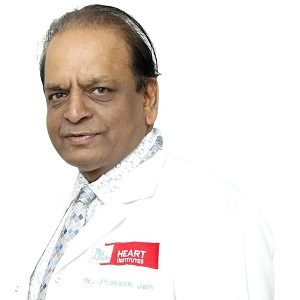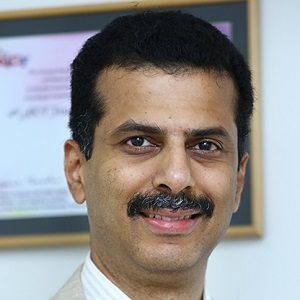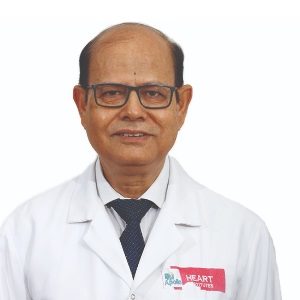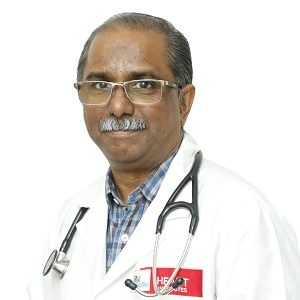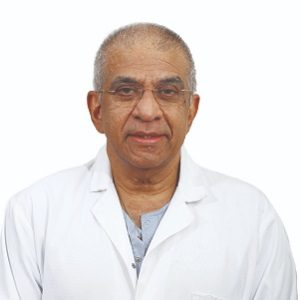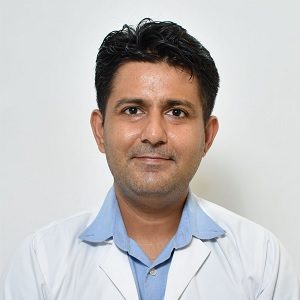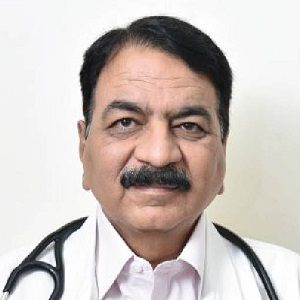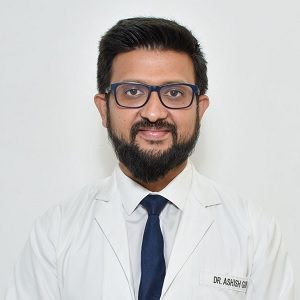Best Doctors in India for Cardiac Ablation
- Interventional Cardiologist, Chennai, India
- Over 25 years’ experience
Profile Highlights:
- Dr. Prakash Chand Jain is a renowned name among cardiology experts.
- Dr. Jain specializes in Transesophageal Echocardiogram, Atrial Fibrillation, Permanent Pacemaker, and Angioplasty.
- With his 25+ years of experience, he benefitted patients from counseling, diagnosis, and treatment. Some services he offers include TMT, Ambulatory BP Monitoring, MPI Test, PET scan, Valve Repair Replacement, ASD closure, etc.
- Interventional Cardiologist, Chennai, India
- Over 15 years’ experience
Profile Highlights:
- Dr. Sai Satish is an internationally celebrated young cardiologist from Tamil Nadu with expertise in the management of heart-related problems.
- With 15+ years of experience, he assisted patients with symptomatic Aortic stenosis, blood vessel blockages, and heart failure.
- He started a series of structural heart programs for those who are executing structural heart therapies and need to advance them with the best practices. The summit drew over 300 heart surgeons and 350 cardiologists.
- Interventional Cardiologist, Chennai, India
- Over 31 years’ experience
Profile Highlights:
- Dr. G Sengottuvelu is an accomplished Interventional Cardiologist in Chennai.
- He is an expert at managing complex PCI & stenting surgeries and structural heart interventions, including percutaneous heart valve replacement & repair (TAVI / TAVR, mitral clip, etc.).
- Dr. Sengottuvelu carried out around 20000 procedures in his 25 years career. He was a pioneer of the transcatheter valve program in the Apollo Group of Hospitals in 2015, performing the first TAVR.
- Cardiac Surgeon, Cardiothoracic Surgeon, Vascular Surgeon, Chennai, India
- Over 35 years’ experience
Profile Highlights:
- Dr. Dillip Kumar Mishra is a well-known and experienced Cardiothoracic Surgeon in Chennai who has completed 35 years of specialized experience.
- The doctor gained experience working overseas in countries like Italy, Saudi Arabia, Bangladesh-Dhaka, and India.
- The doctor offers the best services to the patients, some of the prominent services include Intra – Arterial Thrombolysis, Mitral/Heart Valve Replacement, Cardio-Thoracic Surgery, bypass surgery, Radial Approach Angiography Balloon Mitral Valvuloplasty, etc.
- Cardiologist, Chennai, India
- Over 23 years’ experience
Profile Highlights:
- Dr. Pramod Kumar is a leading Cardiologist in Chennai with over 23 years of expertise.
- Dr. Pramod has completed his CT coronary angio-procedures training at UCLA in Los Angeles.
- To date, Dr. Pramod Kumar has completed over 1500 TEE & 7500+ interventional cardiology surgeries with a high success rate.
- His core areas of interest include interventional cardiology echocardiography and heart failure treatment.
- Cardiologist, Chennai, India
- Over 35 years’ experience
Profile Highlights:
- Dr. Robert Mao is a renowned cardiac surgeon in Chennai having managed heart diseases for more than 35 years.
- He provides consultation and various diagnostic tests. Some procedures and tests he performs include Angiogram, Open Heart Surgery, TMT, Color Doppler ECG, Vascular Surgery, Mitral/Heart Valve Replacement Aortic Aneurysm Surgery, etc.
- Cardiac Surgeon, Cardiothoracic Surgeon, Vascular Surgeon, Chennai, India
- Over 31 years’ experience
Profile Highlights:
- Dr. Vijay Shankar S is a senior cardio-thoracic Surgeon in Chennai having experience of more than 30 years in Cardiac Surgery.
- Dr. Vijay Shankar was a fellow Coronary Artery Surgery and Congenital Heart Surgery at the University of Wisconsin, USA.
- He provides consultation and diagnostic services for Mitral/Heart Valve Replacement, Cardiac Pacing, Invasive Cardiology, ABPM, Balloon Mitral Valvuloplasty, CT Angiography, etc.
- Cardiologist, Gurugram, India
- Over 15 years’ experience
Profile Highlights:
- Dr. Anurag Passi is a young cardiologist in Gurugram and is well-known for his meticulousness, precise diagnosis, and compassionate care of patients.
- He is proficient in performing procedures like Primary Angioplasty, Transradial Intervention, Pacemaker, ICD and CRT implantation, and Complex coronary interventions (Unprotected Left Main, Bifurcation, and CTO).
- Presently, he is practicing as a Senior Consultant of Cardiology at Fortis Memorial Research Institute in Gurugram.
- Cardiologist, Gurugram, India
- Over 24 years’ experience
Profile Highlights:
- Dr. (Col) B Kalra is one of the best cardiologists in Gurugram, with nearly two decades of experience in Cardiology.
- Due to different pieces of training, Dr. Balbir Kalra has accomplished expertise in Clinical, Invasive, and Non-Invasive Cardiology.
- Cardiologist, Gurugram, India
- Over 15 years’ experience
Profile Highlights:
- Dr. Ashish Gupta is a renowned cardiologist in Gurugram with expertise in noninvasive and interventional cardiac procedures.
- He performed several life-saving primary angioplasties in acute heart attacks, complex heart interventions, and ICD/ CRT/ pacemaker implantations with a high success rate.
- Some of the services available with the doctor include PET scan, Nuclear Thallium Test, TMT, Holter monitoring, echocardiography, etc.
Best Hospitals in India for Cardiac Ablation
Cardiac Ablation
Cardiac Ablation is a procedure that involves the use of energy for making small scars in the tissues of your heart. The energy stops unusual electrical signals that are moving through the heart and causing uneven heartbeat or arrhythmia. The procedure treats atrial fibrillation which is a type of irregular heartbeat. Your doctor will perform Cardiac Ablation if the medications and heartbeat resetting (also called cardioversion) fail to work.
Types of Cardiac Ablation
There are two ways of performing ablation. Catheter ablation is a more common one of the two. The other name for Cardiac Ablation is radiofrequency or pulmonary vein ablation. This isn’t a surgical procedure. Your doctor will put a catheter (a thin, flexible tube) into the blood vessels of your neck or leg to guide it to the heart. When the tube reaches the area causing arrhythmia, it will destroy the cells responsible for the same. This makes your heartbeats regular.
- Radiofrequency ablation– The doctor will send radiofrequency energy with the help of catheters to make circular scars around the veins or each group of veins.
- Cryoablation- The doctor will use a single catheter to send a balloon that has material tipped for freezing the tissues and cause a scar.
Types of cardiac surgical ablation : Surgical ablation will involve cutting your chest to gain access.
- Maze procedure- Your doctor will perform this while you are undergoing open-heart surgery for bypass or valve replacement. He or she will make small cuts in the upper portion of your heart while stitching them together to form a scar that stops unusual signals.
- Mini maze- In most cases, people with atrial fibrillation don’t require n heart surgery. Here the need for this procedure arises. Your doctor will make multiple cuts between the ribs while using a camera to perform catheter ablation.
- Convergent procedure- It involves catheter ablation with a mini-maze procedure.
Why it's done?
The procedure helps to correct the problems with heart rhythm. The electrical impulses causing the contraction of your heartbeats must follow a specific pathway through the heart. Arrhythmia or abnormal heartbeat happens due to an interruption in these impulses that are treatable with Cardiac Ablation. Cardiac Ablation is the right option for those who:
- Tried medications for arrhythmia but didn’t get any results
- Had serious side effects because of medications that treat arrhythmia
- Are at a high risk of complications due to arrhythmia
Benefits
Preparation
What to expect?
During the procedure
Your doctor will perform the procedure in the hospital. The nurse will place an IV line in your forearms before beginning the procedure and give you a sedative so that you relax. Your doctor might use general anesthesia instead to make you fall asleep. Your doctor will numb the area near your neck, groin, or forearm after the effects of the sedative set in. The team will then insert a needle into your vein while placing a sheath through this needle.
This is followed by threading the catheters through your sheath and guiding them to various places in your heart. Next, they will inject a dye into the catheter that allows your doctors to see the blood vessels and heart using x-ray imaging. Electrodes are present at the tip of the catheters that help to send electrical impulses to your heart and record the electrical activities of your heart. This process involving tests and imaging for determining the cause of arrhythmia is known as electrophysiology study (EP study). The doctors perform this before Cardiac Ablation to check the most effective way of treating arrhythmia.
Upon identifying the abnormal heart tissue responsible for causing heart arrhythmia, your doctor will direct the catheter tips towards the abnormal tissue of your heart. The catheter tips will allow the energy to create scars and destroy the tissue causing the arrhythmia. Ablation might block electrical signals traveling through the heart so that the abnormal rhythm stops while allowing signals to travel in a normal pathway. The procedure takes around 4 to 5 hours but it may take longer if the procedure is complex.
After the procedure
The nurse will move you to a recovery area so that you can rest quietly for 5 to 6 hours and there is no bleeding at the catheter site. The team will monitor your heartbeat and blood pressure to check if there are any complications. You can go back home on the same day as the procedure if you are in a good condition. However, you may need to stay overnight if your case is complex. Although you may experience soreness, it will hardly last a week. You will also be able to perform routine activities after some days of the procedure.
Results
Risks
The risks associate with Cardiac Ablation are:
- Bleeding on the site of insertion of a catheter
- Infection
- Arrhythmia due to damage to the electrical system of your heart
- Damage to your heart
- Narrowing of the veins present between the heart and the lungs
- Radiation
- Damaged heart valves
- Damage to the blood vessels due to scraping
- Radiation
- Heart attack
- Blood clots in your lungs or legs
- Kidney damage because of the dye
- Stroke
- Death

